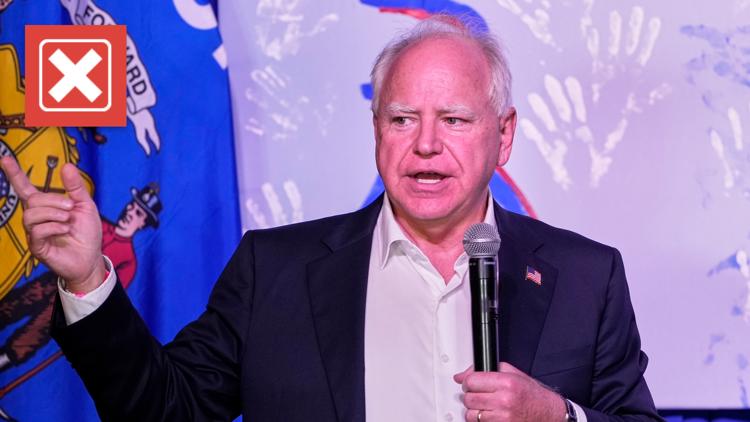It’s illegal to kill a baby after it has been born in Minnesota, just like it is in every other U.S. state.


During the Sept. 10 presidential debate, former President Donald Trump claimed that Minnesota Gov. Tim Walz, Vice President Kamala Harris’ running mate, supports “execution” after a baby is born.
“He also says execution after birth, it's execution, no longer abortion, because the baby is born is OK,” Trump claimed. “And that's not OK with me, hence the vote.”
Several claims about abortions in Minnesota spread following the debate. Some claimed that five babies born alive in Minnesota were “murdered” under Walz. Others have implied that it’s legal to kill a baby in Minnesota after the baby has been born. Multiple VERIFY readers asked if these claims were true.
THE QUESTION
Have “after-birth” abortions been performed in Minnesota during Tim Walz’s term as governor?
THE SOURCES
THE ANSWER
![]()
No, “after-birth” abortions have not been performed in Minnesota during Tim Walz's term as governor.
WHAT WE FOUND
There have been no “after-birth” abortions in Minnesota under Walz’s governorship. The act of killing a living baby is considered infanticide and is illegal in the state of Minnesota, as it is in every other state.
The claims are most likely referencing reports of induced labor abortions performed at hospitals and clinics. While rare, induced labor abortions happen late in pregnancies, when the health of the mother may be at risk or the fetus has an anomaly that would kill or seriously impair it, according to KFF, a health policy organization.
In 2021, five of these abortions resulted in an infant being born alive in Minnesota. In cases like this, these infants are not killed by the medical provider; usually they are not healthy enough to survive outside of the womb and thus die within minutes of birth, even after being given some form of medical care.
Some second trimester clinical abortions and all clinical abortions in the third trimester are done through induced labor, in which a clinician gives the patient medicine to stop the pregnancy and induce labor, according to the Congressional Research Service (CRS) and the Louisiana Department of Health. The trauma of labor usually results in the death of the fetus during the abortion.
The Centers for Disease Control and Prevention (CDC) says that less than 1% of all abortions occur after 21 weeks of pregnancy, and the survival rate of infants born between 22 and 25 weeks is extremely low, even with medical intervention, the CRS says.
Between 2015 and 2022, the Minnesota Department of Health annually published data collected from licensed physicians, providers, clinics and hospitals on infants born alive after an induced labor abortion procedure. Eight of the two dozen reports during that time were during Walz’s governorship.
All 24 of the infants died due to health issues despite whatever medical care was provided.
In some cases, according to the reports, the infants were born with “lethal fetal anomalies incompatible with life” and thus no measures were taken to preserve their life. In other cases, the reports highlight that comfort care was provided. And in still other cases, the reports state that the infant was born before it could viably survive outside of the womb.
There were three cases of an infant being born alive as a result of an abortion attempt in 2019, the first year Walz became governor, and five in 2021. There were no reported cases of an infant being born alive as the result of an attempted abortion in 2020 or 2022.
Providers did not kill or “abort” the infants after they were born in any of these cases, and Walz has not changed the law since then to allow abortion providers to kill an infant after it has been born.
A health omnibus bill Walz signed in 2023, a year after the Supreme Court overturned Roe v. Wade, updated the language to the Minnesota state statute regarding infants born alive as a result of an attempted abortion.
The previous version of the statute required medical personnel provide “all reasonable measures consistent with good medical practice” to “preserve the life and health of the born alive infant.” But the updated version of the statute requires medical personnel provide “all reasonable measures consistent with good medical practice” to “care for the infant who is born alive.”
Both versions of the law still state that an infant who is born alive “shall be fully recognized as a human person, and accorded immediate protection under the law.”
The VERIFY team works to separate fact from fiction so that you can understand what is true and false. Please consider subscribing to our daily newsletter, text alerts and our YouTube channel. You can also follow us on Snapchat, Instagram, Facebook and TikTok. Learn More »
Follow Us
Want something VERIFIED?
Text: 202-410-8808
.png)









 English (US) ·
English (US) ·